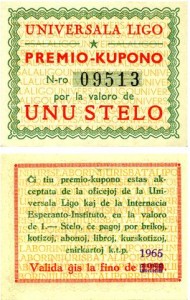Mono (Money) en Esperanto Posted by Chuck Smith on Mar 14, 2011 in Uncategorized
First of all, I want to mention that the Universala Ligo (1942-1993) tried to create an Esperanto currency called the stelo. Theoretically it was supposed to be equal to the value of 1 kg of bread, but in practice, it became equal to one-fourth of a Dutch guilder (the currency in the Netherlands before the euro). Note that steloj are also used as the currency in the instructional Esperanto soap opera Pasporto al la Tuta Mondo.
That isn’t really what I wanted to discuss in this blog post though… I once said, “La angla estas la mona lingvo, sed Esperanto la bona lingvo.” (English is the money language, but Esperanto the good language.) If you want to dig deeper into this, see Joel Brozovsky’s short essay entitled Why does an American use Esperanto? Even so, there’s nothing wrong with talking about money in Esperanto! However, I’ve found that many otherwise experienced Esperanto speakers don’t know some basic terms for money. Do you know how to say the following words in Esperanto: ATM (British: cash machine), balance, debit, exchange rate and stock? Well, starting today you’ll be able to wheel and deal in the international language.
Ĉe la banko – At the bank
While not a banko, the Universal Esperanto Association has accounts for its members which can be used to store money to pay other members or for UEA’s services, such as congress registration or Esperanto books. So, you first open your konto (account) and if you happen to be at their headquarters in Rotterdam, Netherlands, you could put some mono into your account with kontanta mono (cash). Yes, I’ll admit this is the most illogical thing I’ve seen in Esperanto, but kont/o and kontant/a are actually completely different roots. Afterwards, you can check the elspezoj (expenses) and enspezoj (income) and the sum of everything together will be your saldo (balance). Note also that expenses and income can also be spoken about more generically just as spezoj.
Vojaĝante eksterlande – Travelling abroad
While it’s quite old-fashioned and I don’t recommend it for travel today, you could also get vojaĝĉekoj (traveller’s checks) before you leave. I’ve personally found that ĉeko (a check) in Ĉeĥio (Czech Republic) is quite useless, but they could be more useful in other countries like Ĉinio (China). Once you arrive, you might need to interŝanĝi monon (exchange money) in which case, it would be useful to know the kurzo (exchange rate). You could also stop by a monaŭtomato (money automat) and put in your debetkarto (debit card) or kreditkarto. Be careful though, If you take out too much money with your kreditkarto, you could really run up some ŝuldo (debt)!
Investado – Investing
In Turkio, someone might try to convince you to invest money into Turkish rugs to sell back home. However, I think it would be wiser ŝpari (to save) your money in a ŝparkonto (savings account), but be sure to check out how much interezo (interest) it earns you! If you’re feeling a bit more risky, you could buy some akcioj (shares of stock) on the borso (stock market). Whatever you do, mi esperas, ke vi finance sukcesos! (I hope that you’ll succeed financially!)

Build vocabulary, practice pronunciation, and more with Transparent Language Online. Available anytime, anywhere, on any device.
About the Author: Chuck Smith
I was born in the US, but Esperanto has led me all over the world. I started teaching myself Esperanto on a whim in 2001, not knowing how it would change my life. The timing couldn’t have been better; around that same time I discovered Wikipedia in it’s very early stages and launched the Esperanto version. When I decided to backpack through Europe, I found Esperanto speakers to host me. These connections led me to the Esperanto Youth Organization in Rotterdam, where I worked for a year, using Esperanto as my primary language. Though in recent years I’ve moved on to other endeavors like iOS development, I remain deeply engrained in the Esperanto community, and love keeping you informed of the latest news. The best thing that came from learning Esperanto has been the opportunity to connect with fellow speakers around the globe, so feel free to join in the conversation with a comment! I am now the founder and CTO of the social app Amikumu.





Comments:
Dachjo:
I think the only thing you neglected to mention is that if you pay for something with a unit of exchange larger than its price, you’ll receive some restmono.
Chuck Smith:
Actually, I would say ŝanĝmono for that. I’ve never heard restmono, but to be honest, I’m not completely sure about this word. Anyone else have an opinion?
Matthew Chisholm:
What about “apunto” for “change” in the sense of “restmono”/”ŝanĝmono”?
I’ve always used “bankmaŝino”. I’ve never heard “monaŭtomato” before.
It would be nice if this blog included an explanation of “ĝiro” as well, as this term is usually unfamiliar to English speakers and possibly others.
Otherwise, good post.